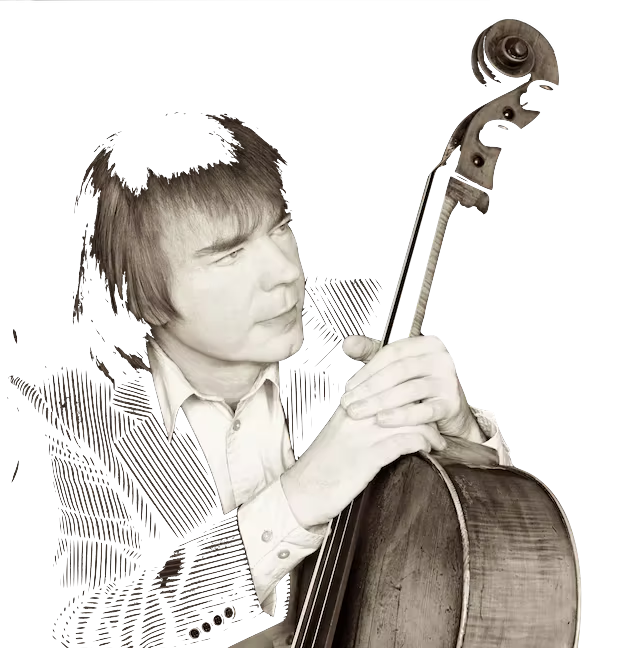CLASSICAL MUSIC IN WESTERN CULTURE TODAY (delivered to the World Economic Forum, Davos, Switzerland, Monday 3rd February 1998) BY JULIAN LLOYD WEBBER
Declining audiences, government cuts, disastrous CD sales, sponsors pulling out of the arts, fewer children learning instruments, and a total lack of interest from the general media – unless semi-naked bimbo violinists or something like the David Helfgott circus are involved. This is the reality of classical music in the West today. It is in stark contrast to music-making in the Far East where there are still huge numbers of children learning instruments, healthy classical CD sales, a media that takes real interest in classical music and – above all – concert halls that are packed with young people as a direct result of that media interest. While I cannot subscribe to the doom-laden scenario of Norman Lebrecht’s book When the Music Stops, the truth has to be faced by everybody involved with Western classical music before it is too late. And the truth is that the vast majority of young people in the West have no interest in classical music whatsoever.
In Britain there has already been a drastic and widely-reported decline in the number of young people taking up instruments – threatening our orchestras of the future – and the many fine classical composers writing today are simply not on their radar screens. Young people are force-fed their culture by the media, especially television, and that culture is pop, pop and more pop. As The Times arts-editor Richard Morrison put it in a cry from the heart last November, “Why do the arts have so few friends in the TV companies, who neither report nor cover anything vaguely ‘highbrow’? Why are business leaders scuttling out of sponsorship deals? Why are teachers not evangelising for the arts in their classrooms?”
But how did all this come about? How, in Norman Lebrecht’s words, has classical music been “pushed to the periphery of public attention”? Why has gimmick-free classical music lost touch with its audience? Ironically, Lebrecht sets the date for the start of the decline at classical music’s zenith – the Three Tenors 1990 concert. But I believe we must look much further back to discover the beginnings of the current malaise and delve into an area which possibly even Mr Lebrecht found too sensitive. This particular ‘hornets nest’ is not even mentioned in his book – despite being arguably the primary cause of classical music’s alienation from its audience. I refer, of course, to contemporary music.
To survive, classical music must be a living, developing art. New music must be coming through, taking its listeners on fresh adventures, pushing at boundaries, exciting its audience. Yet for forty years of madness – from 1945 to the early eighties – classical music turned its back on its audience and shot itself in the foot with the result that, today, it remains seriously wounded.
After the war, everything had to be new. For example, instead of following through the plan to rebuild the beautiful, acoustically superb Queen’s Hall in London, the decision was taken to move out of the city centre and create an entirely new concrete structure south of the river. British music is still paying for that mistake as by common agreement England’s capital city has no acoustically great concert hall for orchestral music. Similar aberrations were happening all over the West as grey concrete mausoleums – which were hardly conducive to an enjoyable evening out – became synonymous with classical music. As the concert halls became more severe, so did the music itself. Suddenly it was only acceptable to write in one style. Composers who had pursued a logical development of the music of the great masters were increasingly disparaged and derided by the new führers of the classical music establishment, for whom tonality and harmony had become dirty words. I am not necessarily criticising that style, but it cannot be good for music to strait-jacket its composers. In the years after the war, Western classical music created a pernicious politburo which proved every bit as effective as its counterpart in the East. In America, composers like Aaron Copland and Samuel Barber found themselves dismissed as dated. In Germany, Berthold Goldschmidt couldn’t even get a hearing. In England, William Walton – and even Benjamin Britten – were under attack. A composer like my father stood no chance. Born in 1914, he began writing music in the ‘30s. Although his early works pushed at the boundaries of tonality, his roots were firmly based in the romanticism of Richard Strauss and Rachmaninov – composers whose music was adored by audiences but increasingly dismissed by the ‘politburo’. My father found it an impossible climate to write in and ceased composing almost completely in the early Fifties – his spirit disillusioned and broken at the age of thirty-eight. Other composers – perhaps made of sterner stuff – soldiered on regardless. In England, Malcolm Arnold composed a prolific number of concertos, symphonies and chamber works. Perhaps, because he also wrote film music, but, more likely because he dared to include a sense of humour in his music, and worst of all wrote tunes, Arnold faced a perpetual chorus of discouragement. When one of his finest works – the Fifth Symphony – was premiered at the 1961 Cheltenham Festival, it was described by one critic as the work of, quote, “a creative personality in an advanced stage of disintegration”. I wish Arnold had sued the thoughtless imbecile who wrote that. It must be scant reward for Arnold that critical opinion has finally swung his way as his near-suicidal despair was widely known. In 1994 The Times, reviewing a rare 70th birthday Proms performance of his Second Symphony, wrote “Malcolm Arnold’s Symphony, and his presence, were cheered to the echo; but it was not always like that. In the central part of his composing career, the time often seemed to be out of joint. While he was making his way in the early Fifties with symphonies and overtures, the musical cognoscenti were still bewitched by schools: the Second Viennese, Darmstadt, Manchester. Almost anything else seemed perverse, reactionary, trivial even. The miracle of Arnold’s music is that it is tightly constructed while sounding relaxed, expansive yet economic.” Thank you, Hilary Finch. But for Arnold the praise came forty years too late, and Arnold was one of many.
While classical music was busy shooting itself in the foot, pop music was making huge advances. Great talents like Elvis Presley and Buddy Holly arrived to captivate the public, and the Beatles and the Beach Boys obligingly provided all the melody and harmony that classical music appeared to despise. In the ‘50s and ‘60s Classical music broke its trust with young people. As a result it lost its relevance to the media, who decided that we were living in a pop culture.
Classical music must never make that mistake again for it has made it much harder for the many fine composers today like James MacMillan, John Adams and John Tavener – successful though they are – to win back the trust of audiences made wary of contemporary music. A new Prokofiev or Shostakovich symphony travelled the world very quickly with a large public eagerly awaiting every note. Now, as a result of the ‘forty years of madness’, it will take any new masterwork considerably longer to be recognised for what it is.
So, is classical music in the doldrums or not? My answer is – statistically – yes, but creatively – no. Today there is a much healthier climate for new music. Musicians and critics are willing to judge a new piece on its own terms instead of wondering whether it sounds like Stockhausen or not. Composers, performers and orchestras are at their most inventive for many years, but we cannot do it all on our own. Western classical music is being starved to the brink of death by lack of media attention. Great concerts are given nightly in our cities, almost unnoticed by the newspapers. Not so long ago many tabloids carried regular reviews of concerts – now days can go by without a single concert review even in quality newspapers.
Yet in the Far East a country like Taiwan (population 21 million) supports no less than six well-filled monthly magazines devoted to classical music and recordings. How many does America (population 270 million) have? Er, none.
In the West, classical music has been sidelined by media bosses and decision makers who – desperately conscious of ratings – are guilty of a gross underestimation of public taste. How many times must it be proved that classical music has a vast audience-reach when given half a chance? Look at the success in Britain of Classic FM and look what happened when BBC Television chose Puccini’s Nessun Dorma as its 1990 World Cup theme. It outsold the pop-orientated efforts selected by other TV companies by millions. When an austere, yet beautiful, work by John Tavener was sung at Princess Diana’s funeral, record shops were inundated with requests for it. Last year – for the first time – British television relayed classical music’s equivalent to the Oscars – the Gramophone Awards. Despite being transmitted at 10.40 on a weekday evening, they were watched by over 2½ million viewers. These are not isolated incidents. They are evidence of the massive potential audience currently ignored by the media.
Today, I issue a challenge to the Breakfast TV companies – those arbiters of culture to the young. Give me four weeks of daily three-minute slots and I will deliver you twenty young musicians who will captivate your viewers. The results can then be recorded for CD and proceeds from the sales donated to a deserving musical charity or organisation.
Western classical music is alive and kicking. But the television companies, the radio networks and the newspaper proprietors have to let the public know.


